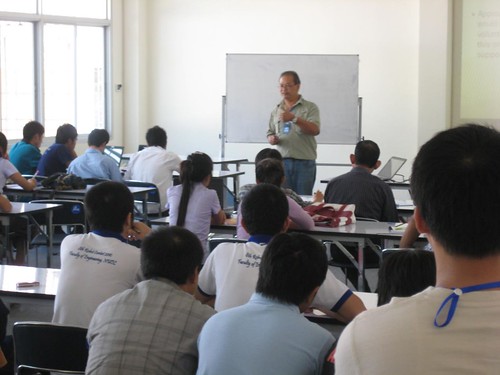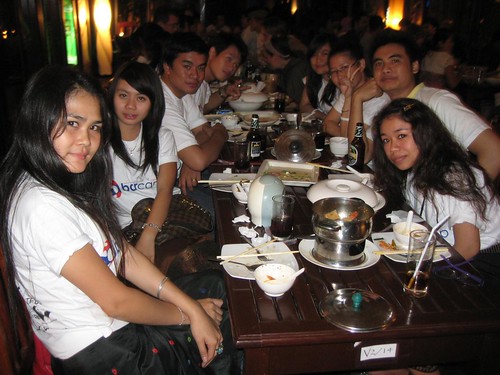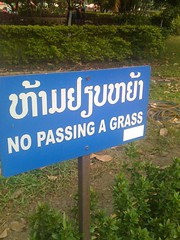
I would call Barcamp Vientiane a huge success: First of all, we proved that this concept works in Laos. Even if it took a while when the participants started to write the topics on the agenda, finally we had around 36 session. Half of them were in Lao language. Then, from the member of the organizing teams point of view, it went incredible smooth. I can't say what went wrong. People helped cleaning up in the end, Internet connection was working (thanks to TIGO again for the backup line). The food was awesome (thanks to Nin and his family). What surprised me a lot was the enthusiasm and the engagement of our volunteers. They usually have a bad job sitting on the reception desk or pointing directions for newcomers and don't have so much time to listen to the sessions. A big applause and Kudo to the volunteers! It's by the way interesting to see that after Barcamp particpants started to connect each other on Facebook in a large scale. We also had people form Thailand, Cambodia, Vietnam, Singapore and Hongkong - that shows that we are now part of the SE Asia Barcamp community.
What about the quality of sessions?
First of all, I think quality isn't the right term. More important and correct is the learning and sharing level, and this was high. From Business development (thanks to Chris Brown) to Lao translation in Google, Iphone App development, How to setup Android Dev on MAC, win, LINUX , to IT for investment and Finance, BarcampVTE, how BarcampVTE begin?, "My hotel sucks! how to plan travel online THE right way", Mindmap (that's only some of the English sessions). Rooms were crowded and that means people were quite interested. The complete schedule on Barcampvientiane.org
We had some money left for a nice After-Barcamp-Dinner were we invited the organizers, the volunteers and our guests from the neighboring countries.

What's next?
Personally I think we will have a next Barcamp in 2011. People already talking about another Barcamp in Pakse and/or Luang Prabang. Why not?
For Vientiane I would like to establish a ICT-Community gathering, like the tweet ups in Vietnam or the Meeting at T&C-Coffee in Cambodia or Beercamp in Thailand. I think it is important to meet at the same place, something like a coffeeshop or restaurant, that is affordable for Lao people. Casablanca on Rue Asian could be such a place.
This gatherings should enable the community to stay connected in real life, not just through Facebook or Twitter. It is always better to meet face to face. A quick survey with our volunteers showed me that Saturday late afternoon (5pm) might be a good time. We should eye two hours, if someone want's to stay longer, no problem.
If your are interested in participating in these gathering, leave me a message in the comments or on my facebook page!



